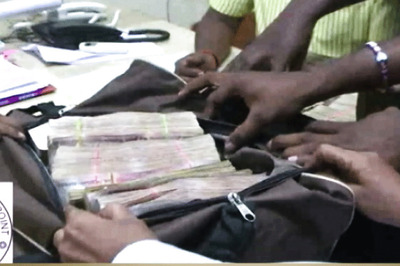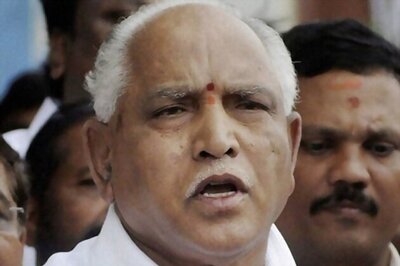
views
Mumbai: A sessions court on Friday rejected the bail plea of Pune stud farm owner Hasan Ali Khan and his associate Kashinath Tapuriah, arrested in March by Enforcement Directorate which alleged that they had laundered $ 93 million in foreign banks and indulged in conspiracy to "wage war against the nation".
The bail petitions were rejected by Principal Sessions Judge, Swapna Joshi, who agreed with the prosecution that granting them liberty at this juncture was not justified.
Opposing their bail, ED Counsel, Ujjwal Nikam, alleged that Khan and Tapuriah had laundered $ 93 million in foreign banks.
He also alleged that $ 300 million had been obtained by Khan from sale of weapons. This, Nikam said, was reflected in some documents recovered during investigation which were signed by him and notarised in London.
Nikam contended that both the accused had hatched a criminal conspiracy with international arms dealer Adnan Khashoggi in the trade of weapons. Thus logical inference could be drawn that they had indulged in conspiracy to 'wage war against the nation', a serious offence under IPC.
The ED counsel said that Khan had acquired passports by submitting forged and fabricated documents from various regional passport authorities like Hyderabad, Patna, Mumbai, Pune and London. Various offences were registered against Khan, Nikam said.
He alleged that Khan had transferred $ 7 lakh from his Swiss Bank account to the account of SK Financial, London.
Nikam submitted that notarised documents seized from the possession of Khan mentioned that Tapuriah was his advisor.
IP Bagaria and Girish Kulkarni, lawyers of Khan and Tapuriah respectively, argued that the offences alleged to have been committed by the accused pertained to the period prior to the enactment of Prevention of Money Laundering Act of 2002, under which they had been charged.
The provisions of this Act could not be invoked even if it is presumed that charges against the accused were true because the PMLA did not have retrospective effect, the defence lawyers submitted.
Lawyers Bagaria and Kulkarni argued that the alleged offences against Khan and Tapuriah were not scheduled offences under part A of PMLA. Hence, the accused may be released on bail.
The lawyers argued that ED had already contemplated action against the accused under Foreign Exchange Management Act (FEMA) and questioned how on the same set of facts the agency could prosecute the accused under PMLA also.
They contended that ED had filed complaint against the accused only under section 3 of PMLA and had not filed any further complaint under IPC for offence of "waging war against nation". Therefore the accused could not be charged with the IPC provision.
Countering the arguments, Nikam argued that the objective of PMLA should be considered by the court. He said section 3 of PMLA are contemplated in such a manner that continuity in action is necessary and therefore section 3 has retrospective effect.
Explaining the distinction between FEMA and PMLA, ED counsel Ujjwal Nikam said the proceedings under PMLA are quasi-judicial in nature and the punishment prescribed is only fine, whereas under PMLA the proceedings are criminal and the court can award sentence too.
Proceedings under both the acts were altogether different and ED could not be debarred from taking action under both the Acts, Nikam argued.
He said the court would have to consider the totality of the case and therefore while considering the bail plea, it would have to take an overall view as to whether the accused had in all probability committed offence or not.
The court would have to examine whether there was prima-facie evidence against the accused and also take into consideration the gravity of offence, likelihood of accused tampering with evidence, public interest and the possibility of accused fleeing from justice, he said.
Nikam said even though the offence of 'Waging war against the Nation' is not registered by ED, the allegation against the accused and documents in possession of the prosecuting agency clearly showed that Hasan Ali Khan had obtained huge amount of money (dollars) from the sale of weapons.
The ED counsel further said that questions such as from where Khan got the weapons, to whom he had sold, who purchased the arms and for what purpose, were of prime importance to the case and would have to probed by ED.
He said if Khan and Tapuriah were granted bail there was a likelihood that they might abscond or tamper with evidence or impede trial.
The gravity of the accused is also to be seen as Khan is alleged to have procured six fake passports in his name from various authorities, Nikam said.



















Comments
0 comment